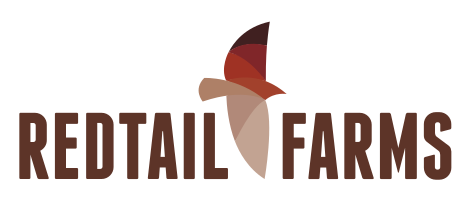
Redtail Farms is located 3 kilometres south of Castor, Alberta, on a rich mix of rejuvenated grasslands and wetlands. Through a wide range of practices, which include rotational grazing, riparian rehabilitation, and permaculture, we are raising nutrient dense, grass-fed beef while regenerating the prairie landscapes that we call home.
But don’t just take our word for it. We believe in educating the consumer on how their food is produced. With an “open farm policy”, as well as seasonal farm to table dinners, we invite you to come experience first-hand how your food is raised, and how it can have a positive environmental impact. We believe in sustainability and responsible care of the land as well as producing delicious, healthy products.
Meet our family, watch our grass-fed animals grow and experience our farm transform through the four distinct seasons of the Alberta prairies. Then fill your freezer with our delicious grass-fed and grass finished beef products or a side of pork. Finally, contact us if you ever have questions about our products or practices.
With an “open farm” policy and a yearly field day, we give people the opportunity to see how their food is raised. We also showcase our environmental efforts and belief in sustainability. In addition, our farm is a learning center with events held throughout the year. This educates consumers and other farmers, but also ourselves. We learn so much from community and care deeply about giving back.
Learn more about our story in this four-part video series. Feel free to contact us with any questions you have about our products or practices.
We are committed to ensuring that the land is continually regenerated through the presence of our animals on the land. Using rotational and intensive grazing techniques we look to mimic the bison that so deeply defined the soils and ecology of our area. We believe that when enacted properly agriculture is an opportunity for ecological rejuvenation, and a sustainable future for generations to come.
Instilled into all our practices and products is a dedication towards our environment, community and future generations. This sense of responsibility guides our farming practices.
To slightly paraphrase an old adage, “We do not [only] inherit the Earth from our Ancestors, we borrow it from our Children”.
Food is not simply a means of sustenance, it is an opportunity for social and ecological connection. Through the production and distribution of our local, sustainable meats we hope to be the intermediaries between resilient ecological systems and healthy communities and families. When eating our products we hope that you experience this sense of connection and reciprocity.
The current Canadian prairie landscape is one defined by industrial agriculture. As soils are mined for their nutrients, the use of herbicides and pesticides continue to degrade our natural microbiology. These challenges, in addition to drained and polluted water, means that we attempt to grow food in an imbalanced, fragile ecosystem.
To not only tackle these issues, but also heal the land, Redtail Farms uses a wide range of regenerative agriculture practices. We use natural plantssuited for the climate (often called permaculture farming) for a multi-layered design on our farm. Every decision we make has to have a long-lasting, positive impact on the environment, while also producing nutrient dense food.
Raising livestock on the grasslands and within the rain shadow of the Rockies means water is a scarce resource. We recognize that water is sacred and essential to all life. We use a landscaping technique for conserving water known as Keyline Design. this way, we ensure our ecological systems are able to capture, store, and distribute water. Our water stores and the wetlands are protected to increase wildlife and plant habitat, and ensure we have clean water.
To properly manage our livestock, and mimic the herbivores that built the original soil of this area we are guided by the teachings of Allan Savory and Holistic Resource Management. Through rotational grazing and proper rest periods, we look to build soil health increase plant diversity, while producing high quality grass finished beef.
With a dedication to our local ecology, we focus on working with nature, increasing biodiversity, and creating a new system of agriculture that will feed our children for generations to come.
Learn more about our sustainable practices, and contact us with any questions you might have on our products or practices.
Yes. Redtail is built on a foundation of social and ethical sustainability. We are committed to raising our animals this thoughtfulness and care. Our cows are grass-fed and grass-finished, which means they spend their lives with a natural, healthy, pasture diet. Redtail pigs enjoy a diet of pasture-grown grasses and grains, and spend their lives exploring and rooting in the prairies and woodlands that surround our Alberta farm.
All of our animals graze free, and are not exposed to pesticides or force-fed hormones or antibiotics.
Yes we do use antibiotics. If an animal is sick we will treat it. We don’t use low-grade antibiotics in our feed. We double the recommended withdraw period if an animal is treated until slaughter.
Our farm is home to hardy Luing cattle and Berkshire hogs, all of which enjoy happy, open-range lives in our prairie sunshine.
Yes! We are happy to have an “open farm” policy here at Redtail, and we invite our customers to come and see how we thoughtfully and sustainably raise our animals and manage our beautiful environment. Throughout the year, we also host an annual field day, seasonally-inspired dinners, and educational programming open to the public.
The current Canadian prairie landscape is one defined by industrial agriculture. As soils are mined for their nutrients, the use of herbicides and pesticides continue to degrade our natural microbiology. These challenges, in addition to drained and polluted water, means that we attempt to grow food in an imbalanced, fragile ecosystem.
Our cow herd on 130 animals, we butcher 50 beef animals a year.
We do not use hormones in our products.